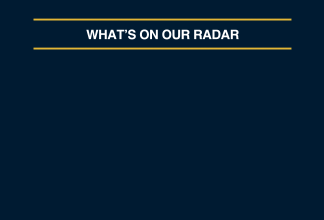Staying Focused During Times of Market Uncertainty
Written by THE INSPIRED INVESTOR TEAM
Published on June 23, 2022
minute read
Share:
Last updated: March 2025
You can never accuse the markets of being dull. With so much happening in the world – trade wars, geopolitical conflicts, ongoing economic challenges – your portfolio can always fluctuate up and down on any given day.
While you can’t control what governments will do or how a company might respond to a change in demand, you can control what you do with your investments. On that note, we asked Stu Kedwell, Senior Portfolio Manager and Head of Global Equities and Sarah Riopelle, Senior Portfolio Manager & Head of Portfolio Solutions and Platform Talent at RBC Global Asset Management about how best to handle market volatility.
Stay focused
Kedwell and Riopelle are advocates for taking a long view and seeing the bigger picture. Over long periods of time, returns tend to stabilize, says Kedwell, and market swings don't necessarily indicate that a 180-degree turn in investment strategy is required. “Maybe you move to the slower lane for a period of time, but you don't get off the highway," he says.
As for keeping the big picture in mind, “You want to put your money into the market based on a well-thought-out investment plan,” Riopelle says.
In turbulent times, it may be tempting to forgo that plan and try to time the market. That, says Riopelle, can be a recipe for disaster. “To time the market, you'd have to get out at the top and you have to also get in at the bottom," she says. “Even if you get one of those right, the chances of getting them both right consistently are extremely slim."
Understanding volatility
Volatility, says Kedwell, is a reflection of markets trying to predict the future. “Markets have a pricing mechanism that tries to sort out the odds of different outcomes. If the outcome of an odd goes from zero to five per cent, that still means it's unlikely. But the share price will factor that in to some degree,” he explains.
Imagine, says Kedwell, you have a sign on your front lawn that said how much your house is worth at every minute of every day. Right before a big storm is expected to hit, the market knocks that price down a little bit to try to account for the possibility, however remote, that something bad happens to your house. Markets act in a similar way.
Check your emotions
When markets are choppy, it's important that investors check their emotions, says Riopelle. “In the middle of volatility, or in the middle of crisis, is probably not the time to be making adjustments to your long-term investment plans,” she says. “You can't control anything that happens in the markets, but you can control how you react.”
By definition, volatility measures the price fluctuations of an investment. While many people associate it with sinking markets, volatility also applies to price gains. But because of a behavioural finance phenomenon called loss aversion, most investors feel the impact of losses more than gains.
Also remember that all investments face varying degrees of volatility. Bonds are usually (although not always) less volatile, while investors generally expect larger price swings in the stock market.
The 3 Ds
To mitigate risks, Kedwell explains how a three-D strategy may help investors ride through waves of uncertainty.
The first two Ds refer to diversification and dividends, strategies investors can explore to reduce risks. The third D is dollar-cost averaging, which involves investing a set dollar amount on a regular basis regardless of market conditions. “For long-term investors, the decline can sometimes become your friend,” Kedwell says of dollar-cost averaging. When markets decline, an investor could buy more units or shares with their set dollar amount, which lowers the average cost per unit.
Riopelle points to the value of holding various asset classes over a longer time horizon, given how certain investments move in opposite directions as market conditions change.
“Historically when stocks are going down, bonds are going up,” she says, adding that diversification enables investors to have “a smoother return experience.”
While both bonds and stocks have recently gone down at the same time, Riopelle says that's not unheard of over shorter timeframes. But over periods of three months or even a year, she says the negative correlation relationship persists the majority of the time.
Another time-tested tip
Keeping a trade journal — essentially a diary of past investment decisions — can help investors understand why certain moves were made, how they worked out and how they felt at the time, says Kedwell. It's important to acknowledge that emotions can play a part in what you may have done and that mistakes can happen along the way.
All of these strategies combined could help in managing emotions, staying focused and working towards a diversified portfolio that works for you.
RBC Direct Investing Inc., RBC Global Asset Management Inc. and Royal Bank of Canada are separate corporate entities which are affiliated. RBC Direct Investing Inc. is a wholly owned subsidiary of Royal Bank of Canada and is a Member of the Canadian Investment Regulatory Organization and the Canadian Investor Protection Fund. Royal Bank of Canada and certain of its issuers are related to RBC Direct Investing Inc. RBC Direct Investing Inc. does not provide investment advice or recommendations regarding the purchase or sale of any securities. Investors are responsible for their own investment decisions. RBC Direct Investing is a business name used by RBC Direct Investing Inc. ® / ™ Trademark(s) of Royal Bank of Canada. RBC and Royal Bank are registered trademarks of Royal Bank of Canada. Used under licence. © Royal Bank of Canada 2025.
Any information, opinions or views provided in this document, including hyperlinks to the RBC Direct Investing Inc. website or the websites of its affiliates or third parties, are for your general information only, and are not intended to provide legal, investment, financial, accounting, tax or other professional advice. While information presented is believed to be factual and current, its accuracy is not guaranteed and it should not be regarded as a complete analysis of the subjects discussed. All expressions of opinion reflect the judgment of the author(s) as of the date of publication and are subject to change. No endorsement of any third parties or their advice, opinions, information, products or services is expressly given or implied by RBC Direct Investing Inc. or its affiliates. You should consult with your advisor before taking any action based upon the information contained in this document.
Furthermore, the products, services and securities referred to in this publication are only available in Canada and other jurisdictions where they may be legally offered for sale. Information available on the RBC Direct Investing website is intended for access by residents of Canada only, and should not be accessed from any jurisdiction outside Canada.
Explore More

Here’s What Every Canadian Should Know About Estate Planning
Insights from Leanne Kaufman to help you feel more confident as you plan
minute read

3 Things We're Watching This Week
What the Inspired Investor team is watching
minute read

What’s Driving the Recent Surge in Gold Prices
Here are some things to watch with the gold market
minute read
Inspired Investor brings you personal stories, timely information and expert insights to empower your investment decisions. Visit About Us to find out more.







